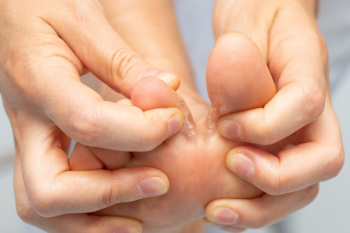Blog
Origins and Symptoms Revealed for Athlete’s Foot

Athlete's foot, a common fungal infection, traces its origin to warm and damp environments where fungi thrive. The condition flourishes in places such as communal showers, swimming pools, and locker rooms, creating an opportune breeding ground for the fungi responsible for athlete's foot. The culprits behind this ailment are dermatophyte fungi, particularly trichophyton species, which thrive on dead skin cells and multiply in moist conditions. Symptoms of athlete's foot manifest as redness, itching, and a burning sensation, often concentrated between the toes. As the infection progresses, the skin may peel, crack, or develop blisters. The discomfort may extend beyond the toes, affecting the soles of the feet. Recognizing these symptoms is vital for prompt intervention and effective management. If you have developed athlete’s foot, it is suggested that you consult a podiatrist who can offer you effective treatment and prevention techniques.
Athlete’s Foot
Athlete’s foot is often an uncomfortable condition to experience. Thankfully, podiatrists specialize in treating athlete’s foot and offer the best treatment options. If you have any questions about athlete’s foot, consult with one of our podiatrists from Pennsylvania. Our doctors will assess your condition and provide you with quality treatment.
What Is Athlete’s Foot?
Tinea pedis, more commonly known as athlete’s foot, is a non-serious and common fungal infection of the foot. Athlete’s foot is contagious and can be contracted by touching someone who has it or infected surfaces. The most common places contaminated by it are public showers, locker rooms, and swimming pools. Once contracted, it grows on feet that are left inside moist, dark, and warm shoes and socks.
Prevention
The most effective ways to prevent athlete’s foot include:
- Thoroughly washing and drying feet
- Avoid going barefoot in locker rooms and public showers
- Using shower shoes in public showers
- Wearing socks that allow the feet to breathe
- Changing socks and shoes frequently if you sweat a lot
Symptoms
Athlete’s foot initially occurs as a rash between the toes. However, if left undiagnosed, it can spread to the sides and bottom of the feet, toenails, and if touched by hand, the hands themselves. Symptoms include:
- Redness
- Burning
- Itching
- Scaly and peeling skin
Diagnosis and Treatment
Diagnosis is quick and easy. Skin samples will be taken and either viewed under a microscope or sent to a lab for testing. Sometimes, a podiatrist can diagnose it based on simply looking at it. Once confirmed, treatment options include oral and topical antifungal medications.
If you have any questions, please feel free to contact one of our offices located in Plymouth Meeting and Ambler, PA . We offer the newest diagnostic and treatment technologies for all your foot care needs.
Origins and Symptoms Revealed for Athlete’s Foot

Athlete's foot, a common fungal infection, traces its origin to warm and damp environments where fungi thrive. The condition flourishes in places such as communal showers, swimming pools, and locker rooms, creating an opportune breeding ground for the fungi responsible for athlete's foot. The culprits behind this ailment are dermatophyte fungi, particularly trichophyton species, which thrive on dead skin cells and multiply in moist conditions. Symptoms of athlete's foot manifest as redness, itching, and a burning sensation, often concentrated between the toes. As the infection progresses, the skin may peel, crack, or develop blisters. The discomfort may extend beyond the toes, affecting the soles of the feet. Recognizing these symptoms is vital for prompt intervention and effective management. If you have developed athlete’s foot, it is suggested that you consult a podiatrist who can offer you effective treatment and prevention techniques.
Athlete’s Foot
Athlete’s foot is often an uncomfortable condition to experience. Thankfully, podiatrists specialize in treating athlete’s foot and offer the best treatment options. If you have any questions about athlete’s foot, consult with one of our podiatrists from Pennsylvania. Our doctors will assess your condition and provide you with quality treatment.
What Is Athlete’s Foot?
Tinea pedis, more commonly known as athlete’s foot, is a non-serious and common fungal infection of the foot. Athlete’s foot is contagious and can be contracted by touching someone who has it or infected surfaces. The most common places contaminated by it are public showers, locker rooms, and swimming pools. Once contracted, it grows on feet that are left inside moist, dark, and warm shoes and socks.
Prevention
The most effective ways to prevent athlete’s foot include:
- Thoroughly washing and drying feet
- Avoid going barefoot in locker rooms and public showers
- Using shower shoes in public showers
- Wearing socks that allow the feet to breathe
- Changing socks and shoes frequently if you sweat a lot
Symptoms
Athlete’s foot initially occurs as a rash between the toes. However, if left undiagnosed, it can spread to the sides and bottom of the feet, toenails, and if touched by hand, the hands themselves. Symptoms include:
- Redness
- Burning
- Itching
- Scaly and peeling skin
Diagnosis and Treatment
Diagnosis is quick and easy. Skin samples will be taken and either viewed under a microscope or sent to a lab for testing. Sometimes, a podiatrist can diagnose it based on simply looking at it. Once confirmed, treatment options include oral and topical antifungal medications.
If you have any questions, please feel free to contact one of our offices located in Plymouth Meeting and Ambler, PA . We offer the newest diagnostic and treatment technologies for all your foot care needs.

